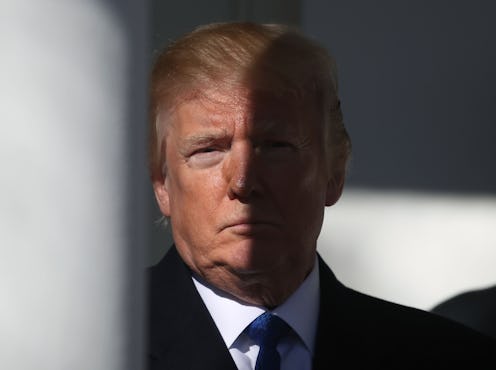News
Online Dictionaries Didn't Want To Get Political In Trump's First Year — It Just Happened

Since the election of Donald Trump, America has seemingly become increasingly polarized and fraught, with political battle lines drawn between communities, cultures, and sects. As it happens, that also includes online dictionaries like Merriam-Webster, and Dictionary.com, which have become more political as the culture's gotten more politicized.
Whether they had intended to or not, a more sharply divided society means even the process of defining words is going to look more political. Take Merriam-Webster. In 2017, a number of its tweets went viral for defining words that were especially prevalent in the political consciousness at the time. Words like "complicit," and "fact," and even "unpresidented," isn't a real word, but rather, Trump's botched attempt to spell "unprecedented."
Dictionary.com, on the other hand, went so far as to make "complicit" its word of the year (thanks to Ivanka Trump) and effectively labeled Vice President Mike Pence a "sycophant." "Complicit" also ended up being a hot search term for Merriam-Webster in 2017, though it ultimately lost out to "feminism" as its word of the year.
But is it really a matter of dictionaries getting more political? Merriam-Webster, for one, tells Bustle that the tweets that drew so much attention last year weren’t some sort of deliberate decision to become more political or to take sides in an ongoing debate. They were part of its Trend Watch, a data-driven effort in which Merriam-Webster identifies words that are being searched a lot, and therefore, the ones people most want to be defined.
Our mission has always been to tell the truth about words."
The first use of Merriam-Webster's Trend Watch came in 2010, when lookups for the word “austerity” spiked amid the Greek debt crisis. Its editor-at-large, Peter Sokolowski, tells Bustle: "Our mission has always been to tell the truth about words, and for most of our history that meant presenting definitions made by careful research into how the language is actually used."
So it’s not necessarily the case that Merriam-Webster has become more political. Rather, the heightened politicization of the times is affecting the kinds of words people are using and searching for. According to Pew, political polarization is currently at higher now than it's ever measurably been, with the gap between a median Democrat and median Republican wider than ever before.
We’re not trying to alienate people, we aren’t trying to be polarizing, we’re just trying to talk about the words that are relevant right now."
In this climate, and with Trump dominating so much of the cultural landscape with his unpredictable Twitter outbursts, it's not surprising that there's a constant supply of politically charged words people are seeking definitions for. And when people want words defined that are popping up in the news, that's bound to make dictionaries seem more political — whether they intend to or not.
Dictionary.com social media manager Lauren Silter tells Bustle that the sycophant tweet related to Pence was a chance to bring language to people on their terms, to define something that was drawing a lot of attention and searches. In other words, what appeared to be a political tweet was in itself the result of an increasingly politicized culture.
"All of our tweets and our content are about being helpful, but also bringing language into a more approachable and relevant light," Silter says. "The sycophant tweet was really us observing how other people were reacting to The Washington Post information, and then putting a language lens on it. ... They’re interested in it already, so what can we add to the conversation as an authority on the English language?"
Silter acknowledges that there's a limit to just how politically charged a dictionary's social media presence can or should be, since it's meant to be a resource "for everyone." However, she also says that some level of politics is unavoidable, because language is often political in nature.
"Language is kind of inherently political. It’s part of our culture, it evolves depending on what’s going on around us," Silter says. "We’re not trying to alienate people, we aren’t trying to be polarizing, we’re just trying to talk about the words that are relevant right now."
For the record, it wasn't all politics for online dictionaries last year. Merriam-Webster content and social media manager Adam Maid tells Bustle a particularly memorable tweet from 2017 was its one about "doggos."
With out lives now injected with politics more than ever before, even the matter of defining words can now look strongly political. But that doesn't necessarily mean that dictionaries are trying to become political crusaders. Nor does it mean that all your content consumption needs to be strictly political; you can take a break sometimes and admire a photo of a cute dog, too.
After all, the wild, chaotic world of politics will still be there for you when you check back in.